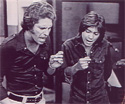
Wes Farrell and David Cassidy
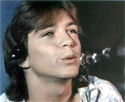
David in the Studio, 1970s
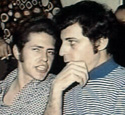
Wes Farrell & Hal Blaine

"Together"
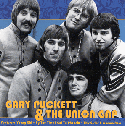
Gary Puckett & the Union Gap
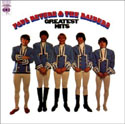
Paul Revere & the Raiders
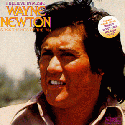
Wayne Newton

The Sugar Bears
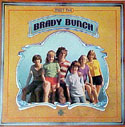
The Brady Kids
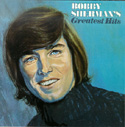
Bobby Sherman

The Bedrock Rockers

GH: Did Wes Farrell bring David in to record, or did the producers?
TB: No, the producers brought David in. They hired him but they didn’t know he could sing. When David knew there was going to be music in each episode, he asked them to give him a shot. Wes came in at that time, and he had a great nose for what worked. He was a great producer.
GH: Did you know Wes Farrell before any of this?
TB: No, we didn’t know Wes, and actually, we weren’t real happy that they hired him at first.
GH: Who hired him?
TB: Screen Gems or Bell Records. I'm not sure which one.
GH: Why would they hire him when they had already hired you?
TB: Because he talked his way into the job, and because we weren’t record producers. This was all being done in-house. Wes caught wind of it, and called up and sold them his track record as a proven hit-maker. He told them if they were going to try and do this without any real producer, they were crazy.
GH: What was the working atmosphere like? Was it difficult to work now that Wes Farrell pushed his way in?
TB: No, it wasn’t difficult, because basically, as hired guns, you go in and if someone says “Hey, hang the picture over there,” then you hang the picture over there. And if they decide to put it on the other wall, then you put it on the other wall. It wasn’t our place to disagree with anything. We didn’t care if the Partridge Family made it or not because we were very busy and very successful.
GH: This was just a one time gig at the time?
TB: Right. Just another gig. And when the pilot sold, then we thought, "well, that’ll be great if we are going to be the group." But I can’t tell you how many pilots we did or how many demos for commercials we had done. You do so many of them that you never knew walking into the studio if you’re going to make 50 bucks or 50 grand!
GH: Who brought “Let the Good Times In” to the pilot? Was it coincidental or did you bring it?
TB: I don’t remember, but it may have come from Screen Gems because it’s a Screen Gems song. It probably wouldn’t have been in the pilot, otherwise, because they really weren’t looking for outside material. When they brought Wes in, he made a very strong case for himself and he brought his own writers in. Tony Romeo, for instance, who wrote “I Think I Love You.” I know that Screen Gems got some, if not all, of the publishing rights. So they came in and said, “OK, you guys are no longer going to be royalty players. You’re back to being studio singers.”
GH: Is that how it’s split? If you are lead vocal then you are a royalty player and if you are background singers you’re not?
TB: Not necessarily, no. If you are an established group then everyone gets royalties. They may not get the same percentage but they all get royalties. So basically, what we said, was “Hey, wait a minute. You have one guy in here, a kid who has never been proven. We’re going to be a lot of the sound in the group and we’re OK with not being royalty players. But if you are going to do it this way, then we want a higher rate because we are going to be a major part of the group’s sound.”
GH: Hadn’t you already agreed to be the group?
TB: We didn’t sign any contracts, though. We never signed any contracts. We were too busy. We were doing three to four dates a day. We’d go from one date to the next. We’d go from a country date to a pop date in the same day. We used to grumble when we got motion picture dates, because they took all day and didn’t pay enough. But it was part of the business; you needed to do it. You would only take a motion picture date if nothing else was happening. It’s a volume business.
GH: So by not ever signing a contract, you were always free to sing for whoever you wanted, or whoever wanted you.
TB: That’s right. That’s one of the things I have loved about my career as a singer. I sang for Elvis’ comeback special in 1968, Sinatra, Johnny Mathis. We were Gary Puckett and the Union Gap and we were Paul Revere and the Raiders. We also sung with Wayne Newton on “Daddy, Don’t You Walk So Fast”. Wes Farrell produced that.
GH: You did backup on all these, too?
TB: Absolutely! But those were the kind of things that we would go into and sing for scale. It wasn’t a television show. The Union Gap always changed. It was a group of singers, not always the same people. Jackie Ward, Sally Stevens, Stan Farber, Ron Hicklin, John and myself. Starting around 1970, a guy named Gene Morford, who was a bass, joined the group too.
GH: Did you ever tour as the Union Gap?
TB: No. Here’s the deal: When you’re on tour, you have the visual. Sound on tour never sounds like the record anyway, so they could get away with it being live. But this is why we were brought in to the studio, because when they tried to do it themselves, they sounded like sh*t! Another example is Karen Carpenter. She and I were very close. Karen was a great drummer, but she wasn’t Hal Blaine. When they recorded “Close To You” and the other early stuff, she told Richard that she didn’t want the pressure of playing drums and singing, too, so she told him to get Hal Blaine to do it. So Hal played on the early Carpenters stuff. Later, when she got more confidence she did play on some stuff, but basically hired Hal as a rule. There was even another drummer playing for Ringo Starr in the early Beatles stuff.
GH: Was that a common thing back then?
TB: Oh, sure! The only bands that sang and played their own stuff back then were bands like the Eagles, Three Dog Night, and a few others, but it took them forever to do an album, because they were doubling up on duty. Those are two different strategies. Paul Revere and the Raiders would be nothing without Mark Lindsey, whether his band members sang on the record or we did. The only thing that using background singers meant is that you came in on budget because there was no time being wasted.
GH: Who else did you sing for back then?
TB: We also did the Sugar Bears and the Brady Bunch when they sang.
GH: Did you do all their albums? Because you didn’t get credit for that either!
TB: Well, the thing is, we didn’t ever care about credit because everybody in the business who needed to know who we were already knew.
GH: When you went in to “fix” The Monkees and The Brady Kids, were they aware that you were there to alter them and make them sound good?
TB: Oh, yeah, they
were there. The Brady Kids loved us. I remember especially that they loved
me because I was the youngest and the closest to their ages. I loved the
little blonde girl [Susan Olsen], she was so cute! And they just adored
us. Same thing with Bobby Sherman. Bobby was so happy that we were there,
and it was so much fun because he knew that we would be helpful to the
record. We weren’t the record, he was, but it was always a very happy situation
and we were paid very well. And that’s basically what we did. We went from
job to job. We weren’t interested in landing the “golden gig.” Every gig
was golden to us.